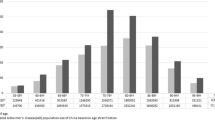Abstract
Background
Alzheimer’s disease (AD) affects the global quality of life of persons who suffer from it and their caregivers, because of the behavioral and psychological consequences associated with the pathology and its caring. The Alzheimer Café (AC) is one example of approach aimed to help persons and caregivers deal with their disease.
Aim
This is a pilot study focusing on the efficacy of AC in relieving caregivers’ and persons’ burdens due to dementia.
Methods
The quality of life of both caregivers and persons who attended the AC was compared with the quality of life of those who did not. Basic and instrumental daily activities and neuropsychiatric functioning were assessed. Caregivers also answered to general well-being and caregiving burden questionnaires. The evaluation took place at the beginning of the intervention and after 1, 3, 6, 9 and 12 months.
Results
Caregivers who joined the AC with their persons with dementia showed to have significantly benefited in the daily care of persons with dementia, in terms of total well-being, vitality, and emotional burden.
Discussion
Although improvements were not observed in persons with dementia who attended the AC, significant benefits were reported by their caregivers, suggesting that the intervention may produce better management of social and economic problems and lead to better emotional support.
Conclusions
The AC seems to help families of AD persons to better manage the disease, and also delay the institutionalization of these persons, which is certainly an ambitious goal for an incurable disorder such as Alzheimer’s disease.
Similar content being viewed by others
References
Marengoni A, Von Strass E, Rizzuto D et al (2009) The impact of chronic multimorbidity and disability on functional decline and survival in elderly persons. A community-based, longitudinal study. J Intern Med 265:288–295
Fratiglioni L, Launer LJ, Andersen K (2000) Incidence of dementia and major subtypes in Europe: a collaborative study of population-based cohorts. Neurol Dis Elder Res Group Neurol 54(Suppl 5):10–15
Vanacore N, Maggini M, Raschetti R (2005) Centro Nazionale di Epidemiologia, Sorveglianza e Promozione della Salute, ISS “Epidemiologia della demenza di Alzheimer in Italia”. BEN-Notiziario ISS, vol 18, n. p 2
Elliott AF, Burgio LD, DeCoster J (2010) Enhancing caregiver Health: findings from the resources for enhancing Alzheimer’s caregiver Health II intervention, vol 58, p 30
Donaldson C, Burns A (1999) Burden of Alzheimer’s disease: helping the patient and caregiver. J Geriatr Psychiatry Neurol 12:21–28
Butcher HK, Holkup PA, Buckwalter KC (2001) The experience of caring for a family member with Alzheimer’s disease. West J Nurs Res 23:33–55
American Psychiatric Association (2013) Diagnostic and statistical manual of mental disorders, fifth edition, DSM-5. American Psychiatric Publishing, Arlington
De Rotrou J, Cantegreil I, Faucounau V et al (2011) Do patients diagnosed with Alzheimer’s disease benefit from a psycho-educational programme for family caregivers? A randomised controlled study. Int J Geriatr Psychiatry 26:833–842
Kitwood T (1997) The concept of personhood and its relevance for a new culture of dementia care. In: Caregiving in dementia research and applications, vol II. Routledge, London, pp 3–13
Brodaty H, Donkin M (2009) Family caregivers of people with dementia. Dialogues Clin Neurosci 11:217
Sörensen S, Pinquart M, Duberstein P (2002) How effective are interventions with caregivers? An updated meta-analysis. Gerontologist 42:356–372
Beinart N, Weinman J, Wade D et al (2012) Caregiver burden and psychoeducational interventions in Alzheimer’s disease: a review. Dement Geriatr Cogn Disord Extra 2:638–648
Brodaty H, Green A, Koschera A (2003) Meta-analysis of psychosocial interventions for caregivers of people with dementia. J Am Geriatr Soc 51:657–664
Knight BG, Lutzky SM, Macofsky-Urban F (1993) A meta-analytic review of interventions for caregiver distress: recommendations for future research. Gerontologist 33:240–248
Martin-Carrasco M, Ballesteros-Rodríguez J et al (2013) Interventions for caregivers of patients with dementia. Actas Esp Psiquiatr 42:300–314
Woods RT, Bruce E, Edwards RT et al (2009) Reminiscence groups for people with dementia and their family carers: pragmatic eight-centre randomised trial of joint reminiscence and maintenance versus usual treatment: a protocol. Trials 10:64
Eggenberger E, Heimerl K, Bennett MI (2013) Communication skills training in dementia care: a systematic review of effectiveness, training content, and didactic methods in different care settings. Int Psychogeriatr 25:345–358
Capus J (2005) The Kingston Dementia Café: the benefits of establishing an Alzheimer café for carers and people with dementia. Dementia 4:588–591
Mather L (2006) Memory Lane Café: follow-up support for people with early stage dementia and their families and carers. Dementia 5:290–293
Heyn P (2003) The effect of a multisensory exercise program on engagement, behavior, and selected physiological indexes in persons with dementia. Am J Alzheimer’s Dis Other Dement 18:247–251
Dubois B, Feldman HH, Jacova C et al (2007) Research criteria for the diagnosis of Alzheimer’s disease: revising the NINCDS–ADRDA criteria. Lancet Neurol 6:734–746
Folstein MF, Folstein SE, McHugh PR (1975) Mini-mental state. A practical method for grading the cognitive status of patients for the clinician. J Psychiatr Res 12:189–198
Katz S, Ford AB, Moskowitz RW (1963) Studies of Illness in the aged. The index of ADL: a standardized measure of biological and psychosocial function. Jama 185:914–919
Lawton MP, Brody EM (1969) Assessment of older people: self-maintaining and instrumental activities of daily living. Gerontologist 9:179–186
Lawton MP (1988) Scales to measure competence in everyday activities. Psychopharmacol Bull 24:609–614
Barberger-Gateau P, Commenges D, Gagnon M et al (1992) Instrumental activities of daily living as a screening tool for cognitive impairment and dementia in elderly community dwellers. J Am Geriatr Soc 40:1129–1134
Cummings JL, Mega M, Gray K et al (1994) The Neuropsychiatric Inventory: comprehensive assessment of psychopathology in dementia. Neurology 44:2308–2314
Grossi E, Mosconi P, Groth N (2002) Il Questionario Psychological General Well-Being. Versione Italiana.: Edizioni “Mario Negri”
Novak M, Guest C (1989) Application of a multidimensional caregiver burden inventory. Gerontologist 29:798–803
Bursac Z, Gauss CH, Williams DK et al (2008) Purposeful selection of variables in logistic regression. Source Code Biol Med 3:17
Velentgas P, Dreyer NA, Nourjah P et al (2013) Developing a protocol for observational comparative effectiveness research: a user’s guide. Agency for Healthcare Research and Quality (US), Rockville
Cohen Jacob (1988) Statistical power analysis for the behavioral sciences. Routledge, US. ISBN 1-134-74270-3
Fargo KN, Aisen P, Albert M et al (2014) 2014 Report on the milestones for the us national plan to address Alzheimer’s disease. Alzheimers Dement 10:S430–S452
Acknowledgements
We are grateful to the Humanitas Foundation-Project Elios Humanitas Gavazzeni, Bergamo, and to all the Volunteers. This research did not receive any specific Grant from funding agencies in the public, commercial, or not-for-profit sectors.
Author information
Authors and Affiliations
Corresponding author
Ethics declarations
Conflict of interest
No potential conflict of interest was reported by the authors.
Statement of human and animal rights
This study was conducted with respect of animals and humans rights.
Informed consent
An Informed consent has been provided by all participants.
Rights and permissions
About this article
Cite this article
Merlo, P., Devita, M., Mandelli, A. et al. Alzheimer Café: an approach focused on Alzheimer’s patients but with remarkable values on the quality of life of their caregivers. Aging Clin Exp Res 30, 767–774 (2018). https://doi.org/10.1007/s40520-017-0844-2
Received:
Accepted:
Published:
Issue Date:
DOI: https://doi.org/10.1007/s40520-017-0844-2



